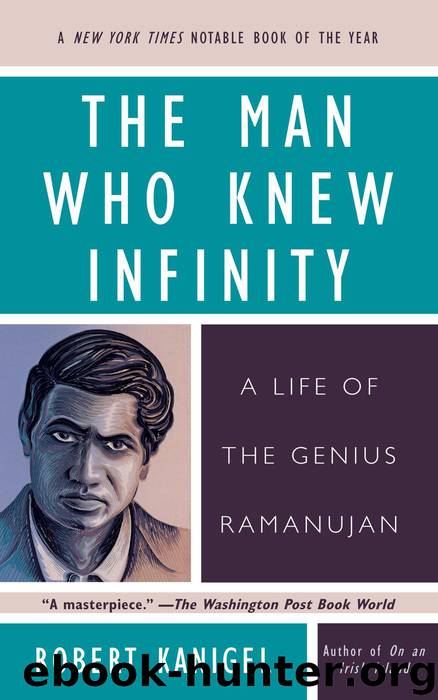The Man Who Knew Infinity by Robert Kanigel

Author:Robert Kanigel
Language: eng
Format: mobi, epub, azw3
Publisher: Washington Square Press
Published: 0101-01-01T00:00:00+00:00
5. S. RAMANUJAN, B.A.
“At Cambridge we are in darkness,” wrote Trinity vice-master Jackson in January 1915. “No gas in the streets or courts; few electric lights and those shaded; candles on the high tables. The roads into Cambridge are blocked to prevent the approach of motors such as those which guided the East Coast Zeppelins. Rumor says that an attack on Windsor Castle was expected last week.”
In April, about a year after Ramanujan’s arrival, Jackson wrote: “In France and Flanders we make no progress. In the Dardanelles we are at a standstill. The army does not grow as it ought. We have not got ammunition for the existing army. The Germans have been preparing villainies for years.”
Wounded soldiers flooded Cambridge, almost twelve thousand being admitted to the First Eastern General Hospital by July 1915. They’d arrive on trains late in the evening at the station, where they were met by white-hooded nurses and motorized ambulances. “When they succeeded each other at frequent intervals for some time,” a Cambridge schoolgirl recalled later, “I knew that there must have been heavy fighting in Flanders or France.”
The maimed, hurt, and sick streamed into Cambridge, the healthy and strong out. Of undergraduates, Cambridge was largely deserted; normally some thirty-five hundred, they now numbered five or six hundred. College fellows served in the Foreign Office, in the War Office, in the Treasury, as well as in the army itself. One Trinity man wrote, in Jackson’s words, that “the front was like a first-rate club, as you met all your friends there.” The university’s medical laboratories, meanwhile, were put at the disposal of the First Eastern General Hospital. The chemical laboratory did research in gas warfare. The engineering laboratories began making shells and gauges for the Ministry of Munitions.
Among the many Trinity fellows to leave was Littlewood, now a second lieutenant in the Royal Garrison Artillery. He had little use for the war, but adapted, just as he had to the Tripos system, affecting a “cheerful indifference.” By late 1915, he’d been put to work on a fresh mathematical approach to fashioning antiaircraft range tables. (“Even Littlewood could not make ballistics respectable,” Hardy would write, in a gibe at applied mathematics, “and if he could not, who can?”) Almost alone among Trinity fellows he was never promoted, and ultimately was relieved of routine chores and allowed to live with friends in London. “Ballistics,” one biographer would gently put it, “did not fill all of Littlewood’s working hours during the war years”; between 1915 and 1919, he managed to collaborate with Hardy on ten joint papers, in areas of mathematics as distant as could be imagined from the war.
Still, he was away from Cambridge—and away from Ramanujan. And he, and his formidable mathematical powers, had been a prime reason to bring Ramanujan to Cambridge in the first place. So that almost before he had caught his breath in England, after barely four months, Ramanujan had been thrown, more dependently than ever, into the arms of Hardy.
Hardy would
Download
The Man Who Knew Infinity by Robert Kanigel.epub
The Man Who Knew Infinity by Robert Kanigel.azw3
This site does not store any files on its server. We only index and link to content provided by other sites. Please contact the content providers to delete copyright contents if any and email us, we'll remove relevant links or contents immediately.
Hit Refresh by Satya Nadella(9132)
When Breath Becomes Air by Paul Kalanithi(8442)
The Girl Without a Voice by Casey Watson(7888)
A Court of Wings and Ruin by Sarah J. Maas(7843)
Do No Harm Stories of Life, Death and Brain Surgery by Henry Marsh(6941)
Shoe Dog by Phil Knight(5266)
The Rules Do Not Apply by Ariel Levy(4965)
A Higher Loyalty: Truth, Lies, and Leadership by James Comey(4959)
Hunger by Roxane Gay(4927)
Tuesdays with Morrie by Mitch Albom(4782)
Everything Happens for a Reason by Kate Bowler(4742)
The Immortal Life of Henrietta Lacks by Rebecca Skloot(4587)
Millionaire: The Philanderer, Gambler, and Duelist Who Invented Modern Finance by Janet Gleeson(4478)
How to Change Your Mind by Michael Pollan(4356)
All Creatures Great and Small by James Herriot(4319)
The Money Culture by Michael Lewis(4206)
Man and His Symbols by Carl Gustav Jung(4135)
Elon Musk by Ashlee Vance(4127)
Tokyo Vice: An American Reporter on the Police Beat in Japan by Jake Adelstein(3995)
